Traditional Poster
What's on the Horizon for Contrast Mechanisms
ISMRM & ISMRT Annual Meeting & Exhibition • 10-15 May 2025 • Honolulu, Hawai'i

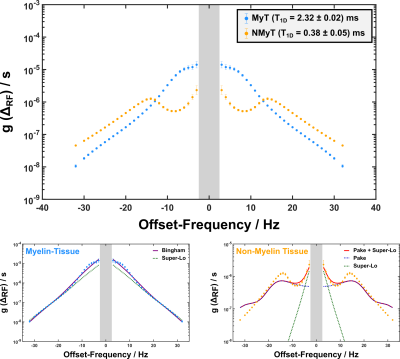 |
4745. Further
Insights into (ih)MT: Four-Pool Model Analysis Accounting for
Dipolar Order in ex vivo White Matter
N. Wallstein, A. Pampel, A. Sandgaard, C. Jäger, R. Müller,
H. Möller
Max Planck Institute for Human Cognitive and Brain Sciences, Leipzig, Germany
Impact: Experimental
evidence was provided for the need for an ‘extended 4PM’
with dipolar reservoirs. Systematic deviations in the z-spectra
were resolved by a ‘free lineshape’ model, providing
enhanced sensitivity to tissue microstructure (e.g.,
cylindrical arrangement of myelin).
|
|
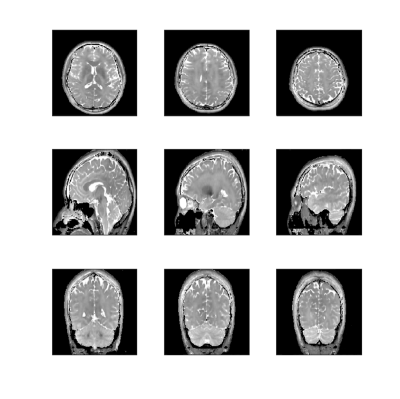 |
4746. Turbo
Spin Echo Imaging at 7T with Bilateral Orthogonality Generative
Acquisitions Method for Homogeneous T1,T2 and Proton Density
Contrasts
Ç. Boğa, A. Henning
UT Southwestern Medical Center , Dallas, United States
Impact: TSE application of BOGA method can accelerate
the clinical utilization of 7T, as the B1+ inhomogeneity
effects are removed from the final contrast without any
prior data acquisitions.
|
|
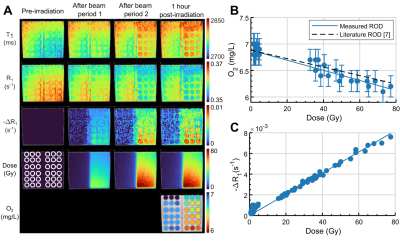 |
4747. Towards
an understanding of radiation-induced R1 changes in irradiated
water on an MR linear accelerator
B. Tran, L. Lawrence, S. Binda, R. Oglesby, B. Chugh, A. Lau
University of Toronto, Toronto, Canada
Impact: An
understanding of the mechanism behind radiation-induced R1 changes
could determine if radiation beam effects can be imaged in
other systems and in
vivo.
|
|
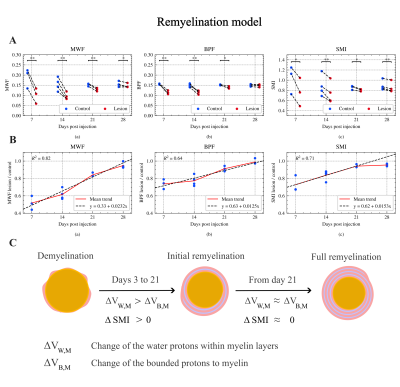 |
4748. Inferring
conduction velocity properties from qMRI-derived Structural
Myelin Integrity (SMI) using qMT and MWF
M. Corral-Bolaños, H. Vila-Merkle, M. Pizzolato, T. Dyrby
Technical University of Denmark, Kongens Lyngby, Denmark
Impact: We introduce a new myelin metric that directly
links myelin’s structural properties to signal conduction
velocity, addressing the limitations of MWF and qMT. It
opens new research opportunities into myelin dynamics
related to its functional properties.
|
|
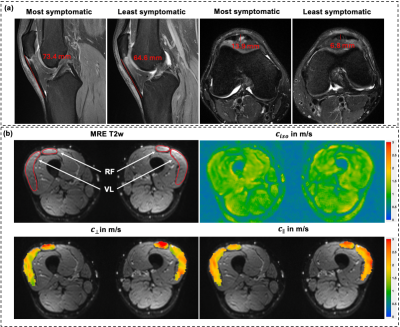 |
4749. Biomechanical
evaluation of muscle-tendon unit rehabilitation following
treatment in patellar tendinopathy patients by combined DTI and
MRE
M. Salimi Majd, M. Lerchbaumer, H. Tzschätzsch, S. Kim, A.
Agres, T. Meyer, S. Görner, J. Braun, I. Sack, J. Guo
Charité - Universitätsmedizin Berlin, Berlin, Germany
Impact: The new anisotropic MRE method showed unique
sensitivity to subtle structural changes in quadriceps
muscles of patellar tendinopathy patients. The anisotropic
biomechanical properties may aid in diagnosing tendinopathy
and assessing the muscle-tendon unit rehabilitation
following treatment.
|
|
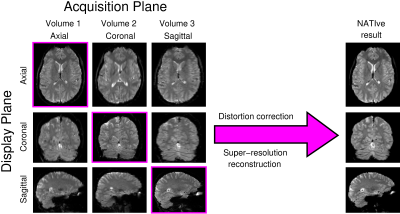 |
4750. Fast,
Motion-Robust, Multi-Contrast MRI of the Human Brain using
Triplanar 2D EPI acquisitions and Super-Resolution
Reconstruction
M. Adam, B. Bachrátá, W. Bogner, S. D. Robinson
Medical University of Vienna, Vienna, Austria
Impact: The inability of many patients to lie still
during MRI leads to motion-corrupted images. Fast imaging
with multiple contrasts could make a significant
contribution to imaging patients with diseases which make it
difficult to stay still, such as Parkinson's disease.
|
|
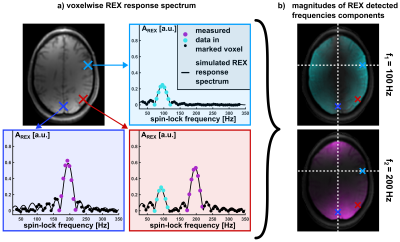 |
4751. Rotary
Excitation based imaging of multi-frequency stimulus fields in
the human brain: a method for optimization of deep brain
stimulation?
P. Albertova, L. Torres, M. Blaimer, M. Wessel, M. Reich, P.
Jakob, P. Nordbeck, M. Gram
University Hospital Würzburg, Würzburg, Germany
Impact: So far, non-invasive methods for
patient-specific imaging of evoking fields induced by
deep-brain-stimulation (DBS) do not exist. REX-based imaging
could enable structured assessment of stimulation target
regions via MRI and thus support the calibration and
clinical testing of neurostimulation devices.
|
|
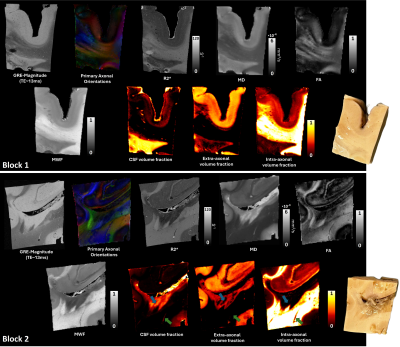 |
4752. 9.4T
MRI-derived myelin measures in post-mortem brain blocks reveal
unprecedented spatial characteristics in Multiple Sclerosis
lesions
D. Gkotsoulias, I. Callegari, J. Leupold, M. Reisert, E.
Bahn, J. Franz, B. Dhital, D. von Elverfeldt, V. Kiselev, M.
Weigel, C. Stadelmann, C. Granziera
University of Basel, Basel, Switzerland
Impact: The unprecedented spatial resolution and
contrast obtained in post-mortem brain blocks imaged 9.4T
MRI open a new window into the assessment of mechanisms
leading to focal pathology appearance and evolution in
Multiple Sclerosis.
|
|
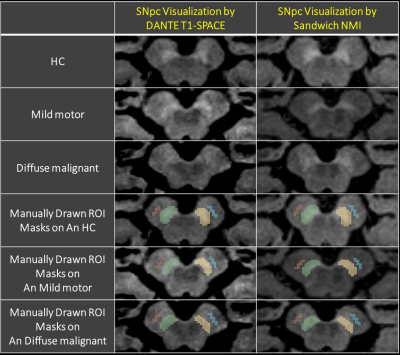 |
4753. Using
DANTE T1-SPACE and Sandwich Neuromelanin Sequences to
differentiate Data-Driven Parkinson’s Disease Subtypes
M-C Kuo, Y-C Shih, R-J Lin, S-H Chen, Y-F Wei, H-Y Yang, J.
O. S. Goh
Graduate Institute of Medicine, Yuan Ze University, Taoyuan City, Taiwan
Impact: Understanding potential and limitations of novel
neuromelanin-related sequences in PD subtype
differentiation.
|
|
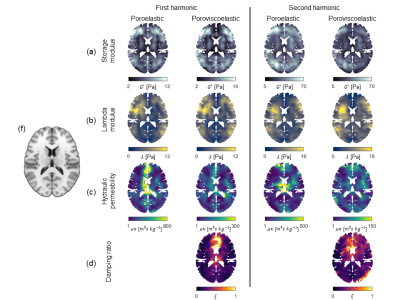 |
4754. Evaluating
the performance of poroelastic and poroviscoelastic models in
intrinsic MR elastography
M. Burman Ingeberg, E. van Houten, J. Zwanenburg
UMC Utrecht, Utrecht, Netherlands
Impact: These results directly contribute to the
improvement of iMRE by addressing previous limitations and
by demonstrating the feasibility of poro(visco)elastic
reconstruction, potentially enabling novel ways of studying
cerebral microvasculature and (mechanical) neurovascular
coupling in the brain.
|
|
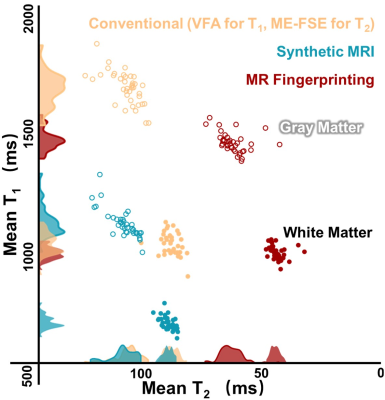 |
4755. 50
Years after Relaxometry: The Performance of Three Quantitative
MRI Methodologies in the Real World
G. Zhao, J. Teng, L. Zhang, Y. Wu, M. Wang, M. Nittka, Y.
Ran, F. Chen, H. Zheng, Y. Zhang, J. Cheng
The First Affiliated Hospital of Zhengzhou University, Zhengzhou, China
Impact: This study highlights the need for standardized
relaxometry protocols or rigorous data screening to minimize
bias, enabling reliable T1/T2 imaging
analysis and advancing clinical translation.
|
|
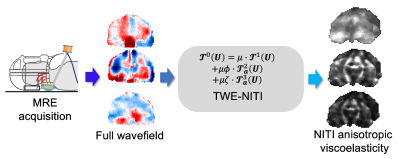 |
4756. Characterizing nearly
incompressible transversely isotropic (NITI) biological tissue
with MR elastography
S. Ma, Z. He, R. Wang, A. Zhang, Q. Sun, J. Liu, F. Yan, M.
Sacks, X-Q Feng, G-Z Yang, Y. Feng
School of Biomedical Engineering, Shanghai Jiao Tong University, Shanghai, China
Impact: The TWE-NITI method offers an accurate and fast
way to measure fiber-reinforced tissues in vivo, showing the
potential application of anisotropic MRE. Furthermore, the
proposed framework may also help solving the inverse problem
in other fields.
|
|
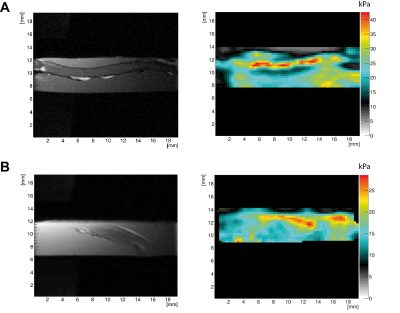 |
4757. Technical
Foundation of Magnetic Resonance Elastography in the Peripheral
Nervous System
H. Fels-Palesandro, G. Mangin, I. Faras, S. Heiland, M.
Bendszus, K. Schregel, R. Sinkus
Heidelberg University Hospital, Heidelberg, Germany
Impact: MRE is feasible in peripheral nerves and 2D-MRE
delivers correct biomechanical information in optimized
in-vitro examination conditions, thus serving as built-up
for optimization of 3D-MRE in peripheral nerves and clinical
translation.
|
|
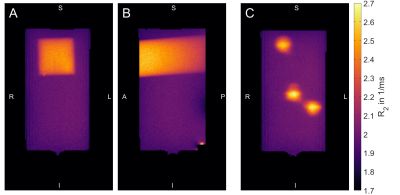 |
4758. Single-isocenter
Multi-target Stereotactic Radiotherapy: An MR Gel Dosimetry
Protocol to Evaluate Accuracy
J. Fischer, B. Thomann, U. Ludwig, T. Fechter, D. Baltas, M.
Bock
, Medical Center University of Freiburg, Faculty of Medicine, University of Freiburg, Freiburg, Germany
Impact: This multicenter study aims to strengthen the
trust in SIMT SRS, which has the potential to significant
time savings for medical personnel and machine time as well
as improvements to patient comfort.
|
|
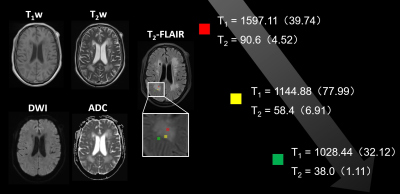 |
4759. The
severity of brain changes measured by MR fingerprinting in
patients with White Matter Hyperintensities
G. Zhao, L. Sun, M. Wang, M. Nittka, J. Cheng, Y. Zhang
The First Affiliated Hospital of Zhengzhou University, Zhengzhou, China
Impact: Our study's outcomes can enhance clinical
assessments of brain white matter abnormalities. This
impacts patients, healthcare providers, and researchers by
allowing for more efficient and accurate diagnosis and
understanding of previously challenging issues, thereby
improving patient care and outcomes.
|
The International Society for Magnetic Resonance in Medicine is accredited by the Accreditation Council for Continuing Medical Education to provide continuing medical education for physicians.